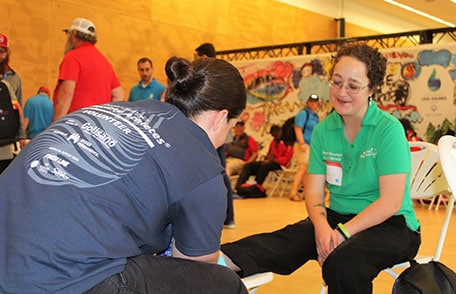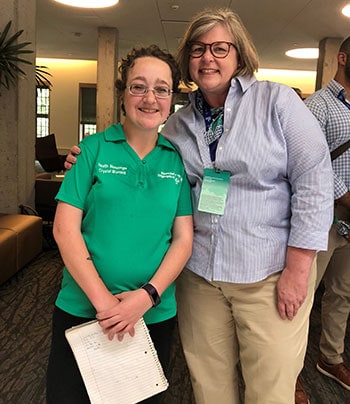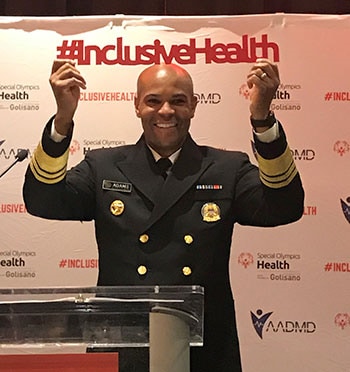CDC and Special Olympics: Inclusive Health

People with intellectual disabilities (ID)—difficulty with thinking, learning, remembering, and reasoning—experience poorer access to quality health care and have poorer health outcomes than people without ID.1 Learn how the Centers for Disease Control and Prevention (CDC) is working with Special Olympics to improve the health of people with ID.
Although progress has been made through federal policies, such as the American with Disabilities Act (ADA), that have provided people with disabilities better access to buildings, transportation, and employment, people with disabilities continue to have differences in health outcomes compared to those without disabilities.2 For instance, people with intellectual disabilities (ID) are more likely to have difficulty receiving quality healthcare services, often receiving fewer preventive check-ups, such as cancer screenings.1,2 People with ID, their caregivers, and health care providers may need to work together closely to make sure long-lasting conditions (e.g. diabetes, heart disease and epilepsy), common among this population are managed successfully.
CDC and Special Olympics have joined forces to address these challenges, break down barriers to inclusive health services and programs, challenge misperceptions, eliminate stigma, and improve the health of people with ID. Together, CDC and Special Olympics are working toward a future in which all children and adults with ID have the ability to get healthcare services throughout their lives and are included in programs that promote long-term health.
Healthy Athletes
The Healthy Athletes program was created by Special Olympics to help meet the health needs of their athletes during local, state, regional, national, and international events. Officially launched in 1997, Healthy Athletes events are conducted in a welcoming, fun environment, and are designed to educate athletes on how to make healthy lifestyle choices and to identify health problems that may need additional follow-up. Currently, Healthy Athletes offers health testing in eight areas:
- Fit Feet (podiatry);
- FUNfitness (physical therapy);
- Health Promotion (better health and well-being);
- Healthy Hearing (audiology);
- MedFest (sports physical exam);
- Opening Eyes (vision);
- Special Smiles (dentistry); and
- Strong Minds (emotional well-being).
Since 2002, Special Olympics has partnered with CDC to conduct approximately 1 million Healthy Athlete tests in the United States at approximately 5,000 events
Through this testing, CDC has also been able to support specialized training for more than 100,000 U.S. healthcare professionals on how to provide care for people with ID in their practices.
Crystal's Story

Crystal Womack, Special Olympics Health Messenger and Stephanie Dulin, Deputy Director, National Center on Birth Defects and Developmental Disabilities, CDC.
From July 1–6, more than 4,000 athletes and coaches met in Seattle for the 2018 Special Olympics USA Games. Health Messenger Crystal Womack was one of the proud participants. In fact she’s a veteran, having been a Special Olympics Washington athlete for 12 years. She has competed in track and field, golf, bowling, and ice-skating. Crystal was born with a heart condition called Tricuspid Atresia. She also has Type 1 diabetes and a visual impairment.
But these conditions don’t stop her from competing and excelling. Special Olympics gave her the tools and information that she needs to live healthy. As a Special Olympics’ Health Messenger, she serves as an ambassador, happy to educate and share these tools with her teammates. In addition, Crystal treats each health care visit as an opportunity to educate heath care providers on how to treat people with intellectual disabilities.
At the Healthy Athletes event in Seattle, Crystal had several health screenings, and received a pair of prescription glasses that she would not otherwise be able to afford.
At the Healthy Athletes event in Seattle, Crystal had several health screenings, and received a pair of prescription glasses that she would not otherwise be able to afford.
“Special Olympics to me is having friends to play with without being asked why I am the way I am, keeping active and enjoying life to the fullest with my teammates at my side!”
The Advent of Healthy Communities and Inclusive Health
CDC also supports Special Olympics through the Healthy Communities program, which recognizes individual Special Olympics programs for offering year-round access to quality health care. Through partnerships with fitness and wellness programs, as well as healthcare providers and other local organizations, people with ID are able to get the resources and services they need to stay healthy. The purpose of the Healthy Communities program is to connect people with ID to health testing, education, and referrals for follow-up health care in their local communities. Healthy Communities was launched in 2012 with six Special Olympics programs being piloted to help strengthen the Healthy Communities model. Currently, 28 Special Olympics programs in the United States are recognized as Healthy Communities.

U.S Surgeon General, Dr. Jerome Adams, at the joint AADMD/Special Olympics Inclusive Health Summit for the launch of the Center for Inclusive Health (2018).
Inclusive Health
Inclusion means understanding the relationship between the way people function and how they participate in society, as well as making sure everyone is able to participate in every aspect of life to the best of their abilities and desires.
To prevent illness and promote healthy behaviors and safety for people with disabilities, CDC is committed to disability inclusion in public health programs, working to eliminate barriers to health care and improve the ability to get routine preventive services. As part of this work, CDC supports Special Olympics’ Center for Inclusive Health. This Center provides online resources, training, and technical assistance for partners who are working to lessen the health disparities faced by people with ID.
Spread the Word Inclusion is a campaign created by Special Olympics in collaboration with Best Buddies and their supporters to inspire respect and acceptance by advocating for inclusive words and actions. According to Special Olympics, the campaign is intended to engage schools, organizations, and communities to rally and pledge their support of inclusion to promote the inclusion and acceptance of people with intellectual and development disabilities (IDD).
Visit www.spreadtheword.global to learn how you can Spread the Word Inclusion for everyone.
Join the inclusion revolution by learning more about the health of people with ID and supporting their inclusion in the health programs and services they need to stay healthy!
References
- Krahn GL, Hammond L, Turner A. A cascade of disparities: health and health care access for people with intellectual disabilities. Ment Retard Dev Disabil Res Rev. 2006;12(1):70-82.
- Krahn GL et al. Persons with disabilities as an unrecognized health disparity population. Am J Public Health, 2015;105 Suppl 2:S198-206. doi: 10.2105/AJPH.2014.302182.
No comments:
Post a Comment